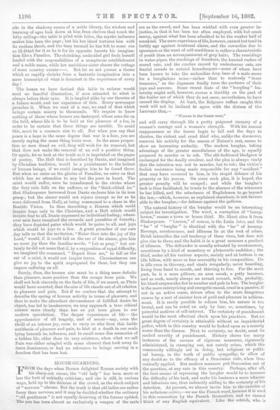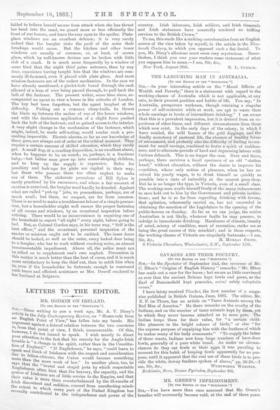HOUSE-GUARDING.
FROM the days when Horace delighted Roman society with his sharp-cut verses, the "old lady" has been more or less the butt of unkindly criticism ; and she is still, in various ways, held up to the derision of the crowd, as the stock-subject of " nervous " alarms. But the truth is that old ladies are rather fussy than nervous, and it may be doubted whether the ordinary " old gentleman " is not equally deserving of the former epithet. The pen has been almost as exclusively a weapon of the male sex as the sword, and has been wielded with even greater in- justice, in that it has been too often employed, with but scant mercy, against what has been admitted to be the weaker half of mankind. The mere experience of life, however, cannot but tend to fortify age against irrational alarm, and the cowardice due to ignorance or the want of self-confidence is rather a characteristic of youth than an accompaniment of grey hairs. The rumblings in water-pipes, the crackings of furniture, the hurried rushes of scared rats, and the crashes caused by undexterous cats, are fearful sounds to untried housekeepers—some of whom have been known to take the unfamiliar deep bass of a male snore for a burglarious noise—rather than to matronly " inner treasures," as the Japanese fondly term the partners of their joys and sorrows. Some recent feats of the " burgling " fra- ternity might well, however, excuse a timidity on the part of the frailer sex of which they do not seem, nevertheless, to have caused the display. At least, the Belgrave ruffian caught this week will not be inclined to agree with the dictum of the Laureate that,—
"Woman is the lesser man,"
and will carry through life a pretty poignant Memory of a woman's courage and a woman's strength. With his annual reappearance as the leaves begin to fall and the days to shorten, the violent and cruel thief who, unlike the dormouse, reserves his activity for the season of Nature's rest, seems to show an increasing audacity. The modern burglar, taking advantage of the greater mercifulness of the age, is equally prepared to murder or to rob. The old-fashioned bludgeon is exchanged for the deadly revolver, and the plea is always ready that the intention was not to murder, but to rob; the victim's foolish resistance being made responsible for any " accident " that may have occurred to him, in his stupid defence' of his property or his person. On some such plea, it is hoped, the greater penalty will be escaped ; and while the burglar's task is thus facilitated, he trusts to the absence of the witnesses he has killed, and the reluctance of Englishmen to go beyond the law,—which, however, as explained elsewhere, is not favour- able to the burglar,—for defence against the gallows.
The natural history of the burglar would be an interesting subject for investigation. The word, a corruption of " bourg- larron," means a town or house thief. Mr. Skeat cites it from Shakespeare. "Larson," of course, is the Latin latro, and the " lar " of " burglar " is identical with the " lar " of larceny. Revenge, covetousness, and idleness lie at the root of crime. Drink intensifies the evil tendency of these vices, but does not give rise to them, and the habit is in a great measure a product of idleness. The defrauder is usually actuated by covetousness, sometimes by a kind of monetary or plutocratic ambition ; the thief, under all his various aspects, mainly and at bottom is an idle fellow, with more or less sensuality in his composition. Ile is idle even in thievery, and steals irregularly, never hoarding, living from hand to mouth, and thieving to live. For the most part, he is a mere pilferer, an area sneak, a petty larcener, and as such, nearly always an arrant coward, with, probably, his blood corpuseulos few in number and pale in hue. The burglar is the more enterprising and energetic rascal, cruel in a passive, if not in an active sense, driven often to the more dangerous course by a sort of sinister love of peril and pleasure in achieve- ment. It is rarely possible to reform him, his nature is too• brutal, and can be acted on only by fear, or, sometimes, by powerful motives of self-interest. The certainty of punishment would be the most effectual check upon his practices. But no great degree of certainty is attainable without an inquisitorial police, which in this country would be looked upon as a remedy worse than the disease. Next to certainty, no doubt, must be ranked severity of punishment. History shows too many instances of the success of rigoious measures, rigorously administered, in stamping out, not merely crime, which the community willingly aid in doing, but religious or politi- cal heresy, in the teeth of public sympathy, to allow of any doubt as to the efficacy of a Draconian code, when Dra- conically applied. But modern manners put Dmconism out of the question, at any rate in this country. Perhaps, after all, the best means of repressing the burglar would be to increase the difficulty of his task, and make his business a more irksome and laborious one, thus indirectly adding to the certainty of his detection. At present, we almost invite him to the exercise of his nefarious metier,—we use the French word, because it is used in this connection by the French themselves, and we cannot think of any English equivalent. Like the ostrich, who is fabled to believe herself secure from attack when she has thrust her head into the sand, we guard more or less efficiently the front of our houses, and leave the rear open to the spoiler. Plate- glass windows are an excellent defence ; it is very rarely indeed that the burglar risks the peril of the noise their breakage would cause. But the kitchen and other lower windows are usually of common, or, at least, of crown glass, which by well-known devices can be broken with little risk of a crash. It is much more frequently by a window of some kind that the night thief gains entrance, than by any door, experience having taught him that the windows are com- monly ill-fastened, even if glazed with plate glass, And most wiudow-fasteners are of the rudest mechanism. In the case we have already mentioned, a gimlet-hole bored through the sash allowed of a loop of wire being passed through, to pull back the bolt of the, fastener. The present writer, some time since, ac- companied an agent to view a house in the suburbs of London. The key had been forgotten, but the agent laughed at the difficulty. Pulling out a common clasp-knife, he thrust the blade up between the sashes of one of the lower windows, and with the dexterous application of a slight force pushed back the bolt of the fastener, and so gained access to the interior. A very slight change in the mechanism of the fastener, which might, indeed, be made self-acting, would render such a pro- ceeding impossible. Electric alarms, so far as our knowledge of them goes, are always out of order at the critical moment. They require a certain amount of skilled attention, which they rarely get. A small dog, of a snarling disposition, is an excellent alarm, when he happens to be on watch; so, perhaps, is a fractious baby,—but babies soon grow up into sound-sleeping children, and to keep up the supply is expensive. Safes for jewellery and lock-ups for plate are capital in their way, but those who possess them too often neglect to make use of them. The elaborate procedure of Bill Sykes is rarely practised by his successors, and where a fair amount of caution is exercised, the burglar need hardly be dreaded. Against what are called " put-up " jobs, no precautions, perhaps, are of much avail; but these, we suspect, are far from common. There is no need to make e. troublesome labour of a simple precau- tion, but a householder might well ensure the proper fastening of all rooms and windows, by an occasional inspection before retiring. There would be no inconvenience in requiring one of the household to report " all right " every night, before going to bed. But, as Colonel Gordon says, in his terse way, " Self is the best officer," and the occasional, personal inspection of the master or mistress ought not to be omitted. The inner doors should be locked, as well as the outer, every locked door being to a burglar, who has to work without crashing noise, an almost insurmountable impediment. Above all, the police must not be relied on to supplement one's own neglect. Prevention in this matter is much better than the best of cures, and it is much more satisfactory to keep the thief out, than to catch him when
even if the householder be fortunate enough to command such brave and efficient assistance as Mrs. Dowell rendered to her husband at Belgrave.































 Previous page
Previous page